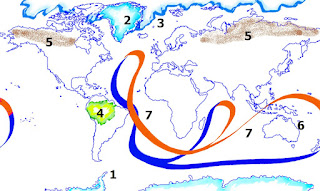In 1948, the United Nations General Assembly adopted
the Universal Declaration of Human Rights – Article 19 of which declares
that, “Everyone has the right to freedom of opinion and expression.”
Today, we hear this right being insisted upon
often. It is insisted upon by those wishing to spread misinformation and lies
as much as by those wishing to oppose such lies.
Underlying this insistence is the assertion that the
individual is paramount. “My rights,” we hear, “are inalienable, and shall not
be impinged upon by society.”
The cult of the individual is very much a westernised
one. Although, even in western cultures it may be only fairly recent. Alexis de
Tocqueville, writing in 1856, said that individualism was “not a word used by our ancestors, for
no one could rely solely on themselves to survive and prosper.”1
More recently,
individualism has grown another limb – that of Toxic Individualism. Having a
belief in oneself, or a self-reliance, is one thing, but that sense of self
becomes toxic individualism when an individual refuses to recognise or
understand the impact one has on the lives of others and their community.
Right
Speech
Several non-westernised cultures have a differing
understanding of what it means to be an individual. The individual is not
separate from, nor separate to, other people or nature. The Vietnamese Buddhist
monk, Thich Nhat Hanh, recognises that “I am, therefore you are. You are,
therefore I am. We inter-are.”
This concept of inter-connection and non-separation is
quite different to the westernised idea of the individual as standing apart.
The recognition of inter-connection has, as would be
expected, a bearing upon speech. Less emphasis is given to Right of Speech
and more given to Right Speech.
Right Speech is
given prominence in the 8-fold path of the Buddha. Although often translated as
right, the Pali word samma, could also be translated as best,
wise, skillful. Indeed, such translations may be the better ones, as the
word right has unfortunate associations with one side of the right-wrong
dualism.
If we consider the concept of Wise Speech, Skillful
Speech, or Best Speech, we begin to understand the impact our speech
can have on those around us, and even upon ourselves.
When the Buddha introduced the 8-fold path, he also
spoke of the connection between thoughts, words, deeds, and character. The
following poem encapsulates the Buddha’s ideas, although the derivation of the
poem is disputed:
“The
thought manifests as the word;
The
word manifests as the deed;
The
deed develops into habit;
And
the habit hardens into character;
So
watch the thought and its ways with care;
And
let it spring from love
Born
out of concern for all beings.
As
the shadow follows the body,
As
we think, so we become.”2
When we speak our words have effects. (If they did
not, why would we speak them?) Often we can see the effect our words have had,
after we have spoken them. It is as though we watch the ripples flowing behind
us in the wake of the ship we are steering. Once the wake has been made, we can
no longer control the ripples. Yet, we also have the option to understand the
ripples we make, before we make them. This is the bow-wave of our ship. The
wake that precedes us. To be a-wake literally means to be so attuned to
the wake we are creating that we fully understand its ripples.
The Right Speech of the 8-fold path is further
enunciated and specifically advises avoiding, 1. lies, 2. divisive speech, 3.
harsh speech, and 4. idle chatter.
What if we were to be mindful of Right Speech
as we proclaim our Right of Speech? Would we see the divisiveness, the
hatred, the bigotry, and the prejudices we see, and hear, today? Maybe,
although I suspect there would be much less. And in that lessening, we might
create a space for us to truly listen to one another. We might enter a deep
listening, similar to that which Thich Nhat Hanh hopes for:
“Deep listening is the foundation of Right
Speech. If we cannot listen mindfully, we cannot practice Right Speech. No
matter what we say, it will not be mindful, because we’ll be speaking only our
own ideas and not in response to the other person.”
Right Speech
does not suggest that we give up our Right to Speech, only that we use
it wisely.
Notes:
1. Alexis de Tocqueville, L'Ancien Régime et la Révolution (The Old Regime and the
Revolution), 1856.
2. This poem has often
been attributed to the Buddha, yet it does not appear in any of the early
Buddhist texts. The origin remains uncertain, although many Buddhists would say
that the sentiments are those of the Buddha, even if the Buddha did not say
them. Other scholars suggest the poem may be of Christian origin from the 19th
century.




